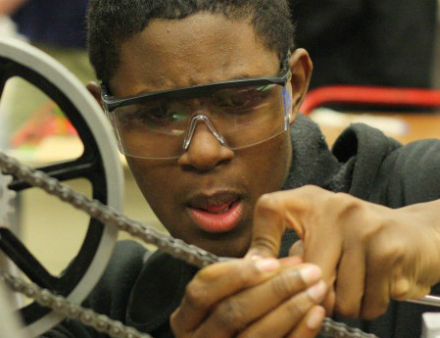
Robots are designed to help humans to do everything from sweep floors to build cars. In Detroit, they also help young people with a task that’s less tangible: keeping them focused on education and sparking their interests in fields like science, technology, engineering and mathematics.
Karl Balke is a physics teacher who coaches a robotics team of about 20 students at the city’s Cass Technical High School. The students are responsible for designing, building, programming, piloting, and developing scoring mechanism for robots, as well as raising the money they need to participate. The program is student-led and allows older students become mentors to younger ones.
There’s no question in his mind that it plays a vital role in their lives.
“It’s like a lot of the other extracurricular programs,” Balke said. “If this program did not exist, some of these students would not be going to school.”
Balke isn’t exaggerating. Although Detroit Public Schools has made an effort to keep kids in class, the district struggles with low attendance. During the 2010-11 school year, student attendance levels fell below 75 percent on ten different days.
Detroit children also have to contend with an environment where 34.5 percent of the city’s population lives below the poverty level, according to U.S. Census figures from 2010.
Although distressing, these statistics highlight how important activities like robotics are for students. Luckily, kids in Detroit who are interested in robots do have one advantage: a central location where youth from across the city can come to work on them.
Currently students from seven Detroit Public Schools and two charter schools participate in after-school robotics sessions at a 5,000 square foot space called The Michigan Engineering Zone (MEZ), located at Orchestra Place in Detroit’s Midtown area. It’s sponsored by the University of Michigan in partnership with Detroit Public Schools.
Youth at MEZ participate in two different international contests. The FIRST Robotics Competition challenges teams to design a robot of about 150 lbs. in six weeks from a common kit of parts. Every year, the contest has a different challenge revealed in January. Last year, students were asked to create a machine to collect and shoot basketballs. The other competition is VEX, in which smaller tabletop robots who try to complete tasks on a 12 foot by 12 foot board.
Participating in MEZ programs gives students a chance to travel around the county and meet people from different backgrounds. On a local level, the MEZ center lets them meet and collaborate with other young people from across the city and from their own school.
Floyd Brehan is a 15-year-old member of the Finney High School team, which had thirteen members last year. He really enjoys the competitions.
“You get to meet new people — learn new things. It’s like a puzzle,” he said. “All you’ve got to do is create and build.”
Jacob Durrah, 18, is a recent graduate of Finney who is now attending college at the University of Michigan and interning with Quicken Loans. His sentiments echo those of Brehan.
“FIRST Robotics is amazing. If you’ve ever played football, it’s that kind of intensity,” he said.
He credits the competition with changing his attitude about school. After participating, he also became involved in the National Honor Society, the chess club and student government.
Jordyn Morgan, 16, belongs to the Cass Tech team. Originally she wanted to go into medical science after high school, but working with robots is making her reconsider.
“I love working with my hands so much,” she said. “It made me change what I wanted to do for a career. Once I got into robotics, it made me want to go into mechanical engineering.”
It is changes like these that get people like Tito Huffman involved. He’s a professional engineer who mentors students in robotics at Finney.
Huffman believes the program is important not only because it teaches basic skills like working with tools, but because it changes the way students think. For him, robotics gives young people an opportunity to work in a professional atmosphere while learning how to solve problems.
The most important part of the program for Huffman, however, is getting students to develop a plan for life after high school.
“I’ve seen some that never considered to go to college actually decide to go. They may not be going into a technical field but they actually decide what they want to do after they get out of high school,” he said. “I’ve seen students change their total mind as to what they want to do in their lives.”
Detroit Robotics Clubs Spark Technology-Driven Learning In City Schools.